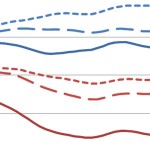GOP Congressional Candidate Riley Sees Merit in Raimondo’s Hedge Fund Strategy
Instead of “chasing after returns” that could be unrealistic, and potentially detrimental, Rhode Island General Treasurer Gina M. Raimondo has seized on a new strategy built around hedge funds. Some investment specialists have been critical of this approach, because hedge funds typically charge higher fees and have a tendency to become overly weighted in cash positions.
But Michael Riley, a Republican candidate for Congress from Narragansett, said in an interview that Treasurer Raimondo’s strategy “makes sense on the surface,” so long as the assets “are truly uncorrelated with the existing assets in the pension fund.”
Rhode Island currently sets the assumed rate of the return for the state pension system at 7.5 percent. This figure is used to determine how much money must be paid into the pension system each year. After last autumn’s state pension reform, it also determines how much current retirees receive as cost of living adjustments (COLAs). The COLAs rise or fall on an annual basis depending upon how closely the actual rate of return corresponds with the targeted 7.5 percent figure.
Raimondo’s plan calls for investing $900 million in 19 hedge funds in an effort to reduce risk. This equates to about 12 percent of state pension assets. Although hedge funds tend to produce smaller returns, they would help to stabilize the retirement system, avoiding sharp market swings that could ultimately produce higher losses over the long term, Raimondo has argued.
Riley, who is a founding member of the Coastal Management Group, a Rhode Island investment advisory firm, sees “diversity” as the key to financial success. While pension fund managers have traditionally invested in equities, fixed income, and cash in various weightings, there are a variety of portfolio options available to accommodate varying levels of risk, he said. The set of optimal portfolios that offer the highest expected return for a defined level of risk or the lowest risk for a given level of expected return is known as the “efficient frontier,” Riley explained.
“I believe without having seen the actual allocation to the various funds that Mrs. Raimondo has chosen a very specific level of risk and optimized her portfolio,” he said. “This produced a need for alternative and non-correlated asset class investments that she believes are best managed by hedge funds. Therefore, on the surface, there appears to be an effort to reduce risk, and it makes sense that hedge fund investments can and should be a part of that decision.”
Economic renewal has been a major theme of Riley’s campaign. He has been sharply of Obama administration for piling up additional layers of debt and for “creating structural impediments to growth” that must be corrected with policies that restrain government spending.
“This administration instead seems intent on leading our nation down a path toward insolvency,” Riley has said. “It has grown our national debt from $10 trillion to $15 trillion in just the past three years, resulting in a $48,000 debt for every person in America. The nation cannot expect to regain its financial footing until we get our debt under control.”
But at the state level, he credits Raimondo for taking steps to mitigate risk and maximize long terms gains.
“Hedge funds can and do invest in all types of instruments and are usually experts in their field, but it is up to the state’s investment manager to monitor the various investments and themes so there is no style drift from their stated exposures and objectives,” said Riley who is also the founder and president of the Rhode Island Hedge Fund Association, a non-profit group.



